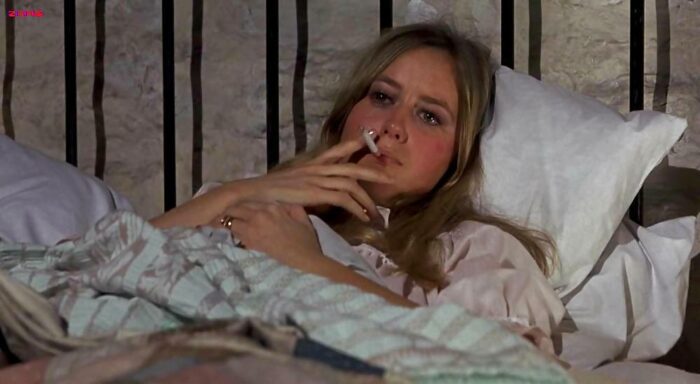Straw Dogs was only my second Sam Peckinpah film, and though my feelings about it remain complicated, I still consider it a vast improvement over the tedious, reactionary, and ignorant The Wild Bunch. Both films have the same ambivalent relationship to violence, reviling it in principle while relishing it in practice, but that contradiction is far, far more convincingly expressed here. It falls in line almost with its Australian contemporary Wake in Fright, in which another mild-mannered urbanite is pulled into a black hole of violent machismo and sexual jealousy. It employs the same schemas of sexual aggression and fascinated revulsion at male bonding rituals, though there’s nothing here as palpably unnerving as that film’s infamous kangaroo hunt. Into this though, Straw Dogs weaves a more controversial thread of sexual violence, displaying at least a curiosity concerning the feminine experience of violence, leading to its most infamous and disquieting content, about which controversy reigns to this day.
The story begins with College professor David (Dustin Hoffman) and his wife Amy Sumner (Susan George) arriving in the small Cornish village where Amy grew up. They are ostensibly there so David can work on his research, but it slowly becomes clear that David is actually running from something: David’s sense of social responsibility. Upon their arrival, the couple is met with ridicule, hostility, contempt, and sexual aggression from the local menfolk, including from Amy’s possessive old flame Charlie (Del Henney). What transpires then takes the form of two parallel stories, the rowing division between the characters represented by their differing perspectives and levels of knowledge of what unfolds.
Charlie and his friends take David out on a hunt, abandon him on the moors, and return to his house where they rape Amy. David returns home, embarrassed by the prank pulled on him, but he remains ignorant of what has happened to Amy. Later, after a known local sex offender is suspected of abducting a teenage girl, the Sumner’s offer him refuge and when the locals come to claim him David resolves to protect him. At no point in the film does David discover that his wife has been raped, so David and Amy have two entirely different perspectives on what is really going on between them and the locals. It is precisely this fact that makes Straw Dogs feel as disjointed as it does, by the time David’s story overtakes the narrative, Amy’s story has still not been resolved, and really, never is.
In respect to Amy’s story, the film reminded me less of Wake in Fright and more of Robert Altman’s flawed but interesting Images, and even, to a lesser extent, Nigel Kneale’s chilling teleplay Baby. It is the story of a woman married to an inconstant and inconsiderate man, who is blind to the fact she is made to suffer the consequences of his actions, and she suffers in silence, after all, it’s not as if this particular man would listen to her anyway. Amy suffers terribly at the hands of her attackers, but particularly so in that—like her husband—she experiences an ambivalent relationship towards the violence she is subjected to, and ultimately agent of.
She is, of course, part of the same community that comes back to torment her, and experiences a self-loathing at her own unearned sense of responsibility for what happens to her. The film was justly controversial for implying Amy invites and briefly takes an illicit pleasure in the violence she is subjected to, but these moments are complex and fleeting. The abiding impressions with which the film leaves the viewer are of her trauma and self-loathing, her fear as she watches her ineffectual husband attempt to take control of a situation in ignorance of what she has already undergone, her loathing of that ignorance, and her own desire not to confront what has happened.
She was unfulfilled by her husband, and this leads her to internalise a sense of guilt after she is raped, erroneously conditioned to feel that on some level, she has been unfaithful and invited her suffering. When David finally does take a stand against the locals, she objects, knowing by this point what the consequences to her are likely to be, and this time, David will know. As infuriating as his ignorance of her experience is—to the viewer and to her—it enables her to deny it, and to acknowledge it to him would rob her of the refuge his blindness has become. The fact she conceals her trauma from David of course only deepens her sense of guilt, leaving her complicit in their escape from justice. Perhaps as the viewer, we are glad to be spared the discomfort of the moment where David discovers what his wife has already suffered.

As I read it, her story is in fact far more interesting than that of her husband, and in some respects is deserving of acclaim as one of the more honest and convincing portrayals of a rape and revenge narrative. It is one of the few that truly seems able to capture such a skin-crawling sense of revulsion, internalised guilt, and pain. This is in no small part due to the fantastic performance of Susan George, who manages to capture these complex and contradictory feelings with piteous and frightful efficacy. Popular feminism often cries out for rape and revenge narratives that restore the dignity and pride of the survivor, but it’s a sad truth that surviving sexual assault does not inherently make someone a stronger person, and empowering narratives involving sexual assaults—though they have their place—are too disingenuous to be allowed to entirely erase the alternative.
It’s unfortunate that Peckinpah isn’t more cautious in other respects. He literally introduces Amy with a shot of her breasts jiggling in a see-through sweater. The male perspective is one he never fully yields, even in the film’s best moments. However, his uncompromising approach to the material is what makes it so challenging and disquieting. Like the actions of the characters, there are parts of Peckinpah’s direction you condone and parts you don’t, and it’s not just what’s happening, but how you’re being shown it that sets your teeth on edge. Not only does Amy feel a sense of responsibility for what happened to her, but the film also entertains that possibility for her, deliberately gaslighting the audience into sharing that sense of guilt.
The film shifts perspectives and tones considerably in the last half an hour, becoming a more enjoyable, and more straightforward film. What emerges in the film’s final third is more of a political allegory for authoritarian control in the United States. Coming in the midst of Vietnam, David abandons the struggle in his home country and runs into a guerrilla war of his own in rural England. After a life of running away from confrontation, he is finally forced onto a hill he is prepared to die on. Though, as the film implies, this comes more out of sexual insecurity than principle, and certainly not out of love for his wife. Hoffman does what he can with his role, but doesn’t effectively marry the character’s mousy, principled nature with his brutal heroics nor his lousy treatment of his wife.
It is often the films that don’t quite work that have the potential to leave us most shaken. Satisfaction is rarely conducive to a real sense of shock and unease. I can watch a film like Martyrs (2008), Possession, The Texas Chainsaw Massacre, Irreversible, Come and See, or Dancer in the Dark, and share with the character’s torment and suffering, and emerge feeling rejuvenated, the satisfying success of those films leaving me shaken, but filled with confidence that such flawless artworks exist to restore humanity. These are the films that take you into humanity’s dark heart and back out again. It’s the films where the wheels come off and that fail to successfully purge the emotions they cultivate so carefully – Munich, Marriage Story, New Order, Requiem for a Dream – that often leave me feeling genuinely upset and disgusted with a world that has such films in it. These are the films that take you to the edge and then leave you there, unhappy and unable to see a way back.
With its bifurcated narrative, Straw Dogs manages to be an example of both. Viewed from David’s perspective, it’s a conventional thriller with a reassuring resolution, but from Amy’s perspective, it’s an abyss built on trauma, pain, and lies. Though she delivers the final trigger-pull, we get the sense there’s no catharsis for Amy, no consummation for her pain, and no exorcism of her trauma. She’s not even present in the film’s epilogue as David drives back into town, a rueful smile on his face, she’s left on that staircase, halfway up and halfway down. Some viewers may experience Straw Dogs in such a way that allows them to leave with David, others will be left on that staircase with Amy.
Straw Dogs is in some ways an admirable film, and in others a contemptible one, but it’s easy to see how it has remained magnetic to audiences throughout the years. Though it is clearly flawed and fails to reconcile its many facets, its enduring power to unsettle is as attributable to those many flaws as it is to the superb central performance of Susan George.




